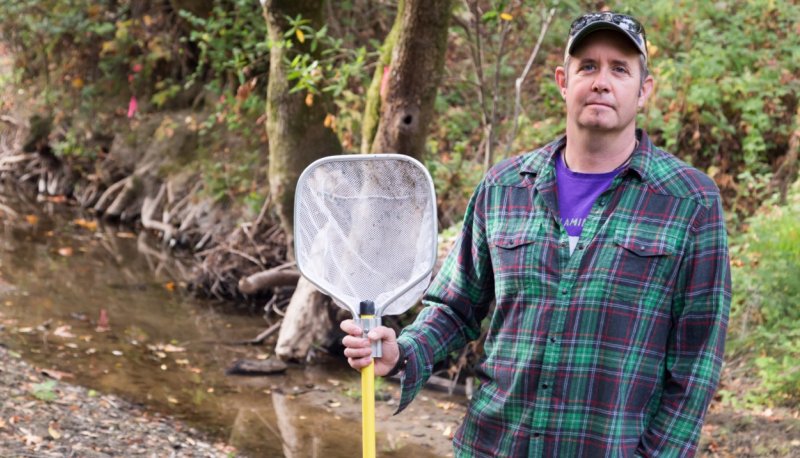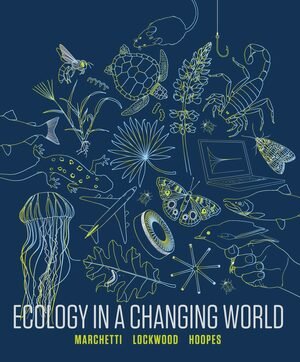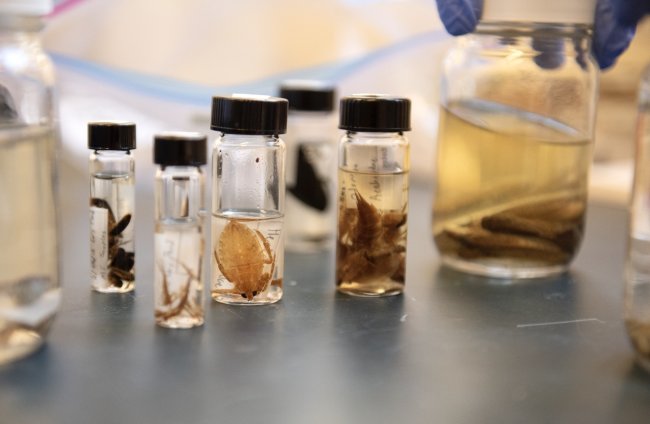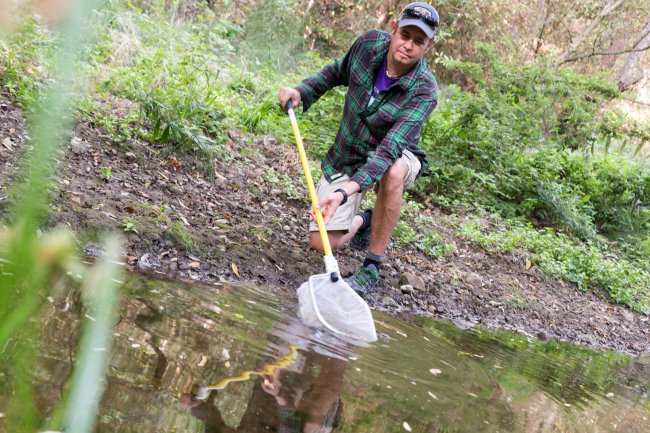
For over 30 years, Michael Marchetti has been one of the leading scholars of aquatic ecosystems in Central and Coastal California. In his latest textbook, he hopes to help "the next generation of students to become ecologically literate." / Photo by James Goss
Scientist at Work: Michael Marchetti on His Innovative New Textbook, ‘Ecology in a Changing World’
Marchetti wrote the book alongside two longtime collaborators and friends, Julie L. Lockwood and Martha F. Hoopes. They felt the need to reappraise the fundamentals of ecology “through the lens of the Anthropocene,” he explains.
“At Work” is a series that highlights Saint Mary’s faculty and staff at work in the world. Artists, writers, scholars, scientists—we sit down and dive deep into their latest projects.
Of all the comic strips taped to Michael Marchetti’s office door—and there are many—one felt especially relevant to a conversation about ecology and humanity. A fish, dragging itself out of the primordial pond, gradually evolves legs, then fur, moving from ape to Neanderthal to upright homo sapien. His final form? A scowling, balding man, pouring the contents of his trashcan back into the pond from whence his species came.
After a summer of record-shattering, climate change-fueled heat, it doesn’t feel much like a joke. But Marchetti, the Fletcher Jones Professor of Biology in the School of Science, doesn’t attach any particular significance to that cartoon, he tells me one August afternoon. As a grad student at UC Davis and then a professor at California State University Chico, he had grown used to faculty offices being papered with Far Side panels. But when he arrived at SMC in 2011 and saw bare doors, he decided to set a trend. He gestures toward his collage of cartoons and memes. “I don't actually know where most of those things came from,” he admits, leaning back in his swivel chair.
Marchetti may give off a laidback impression—he did miss our first interview appointment because, as he explains apologetically, “I was rocking out to the Steve Miller Band in my lab while working on the microscope”—but that belies his industriousness as an ecologist. For over three decades, he has been one of the leading scholars of freshwater invaders in aquatic ecosystems in Central and Coastal California, writing more than 40 peer-reviewed publications in premier academic journals. He has also collaborated on two widely-used textbooks, including 2015’s Invasion Ecology, co-authored alongside Julie L. Lockwood of Rutgers University and Martha F. Hoopes of Mount Holyoke College.

His third textbook, Ecology in a Changing World, written again with Lockwood and Hoopes, may prove to be the most popular yet. Published in July 2023 by W. W. Norton, the book is already being used in college classrooms throughout the country. It’s gratifying for Marchetti—particularly since, as he tells me, ecology has needed a refresh for quite some time.
I guess my first question is, did you anticipate your book being published during the hottest month in recorded history?
Definitely not something we thought of. It’s challenging, certainly, as an ecologist, to stay positive. I started graduate school in 1990, and in the 34 years since, professionally and personally, I’ve witnessed the degradations happening and people not responding to them. This year, it seems like people are really taking notice—although some of us have been screaming in the wilderness for decades.
But yeah, it can be hard to try to think of ways we can address and combat climate change. That's what this book is supposed to do, to some degree.
You and your co-authors start the textbook with the origins of ecology, which derives its name from the Greek word oikos, meaning house or dwelling place. But you also emphasize that this house—our earth—is not some static thing. Can you talk about why that early framing of ecology needs to be updated?
I think it’s important to first clarify what ecology is, because while there’s a lot of overlap between ecology and environmental science, they’re not really the same thing. Whereas environmental science looks at how humans interact with their environment, ecology is really focused on understanding how organisms and their environment interact.
Ecology’s also a relatively new field of science, compared to physics or chemistry. The term ecology was first coined in 1866 by a zoologist, Ernest Haeckel. His big idea was “the doctrine of the household.” Haeckel viewed the planet as a systemized place where organisms live, analogous to humans living within a household. To run a home, you have to understand money, food, water and waste. The earth has systems, too: evolution, food webs, mutualism, and so on.
Most of the ecology textbooks out there were written with Haeckel’s framework of our world being a fairly static place. And clearly, that's not the case, right? Human influence has touched and reached every corner of the globe. There are no places left where you can go and be like, “Here's the natural environment without humans.” It doesn't exist anymore.
Talk a little bit about the genesis of Ecology in a Changing World.
Well, Julie, Martha, and I have known each other for nearly three decades and are very good friends. We wrote another textbook together, Invasive Ecology. And it was in writing that book that we began brainstorming how to revitalize the foundational ecology concepts we teach to our students.
When we started putting this book together, we had three guiding principles. One was teaching ecology through the lens of the Anthropocene: Every chapter had to use examples that were focused on and influenced by human changes on the planet. The second thing we wanted to do was make a textbook that reflects how students actually learn. Textbooks tend to be encyclopedic compendiums without a lot of narrative tissue linking ideas together. Turns out, those linkages are critically important for how students learn! We made a point to write only 15 chapters—one for each week in a typical college semester—and make sure ideas in the first chapter inform every chapter.
The third guiding principle, which is a huge one, is that ecological study is an inherently quantitative enterprise. You can study physiology or some aspects of biology and not necessarily have to quantify it. But ecology is really about counting and math. So where a lot of textbooks put that off to the side, we tried to build it in throughout. That allows students to hone their quantitative reasoning skills as they work their way through the book.

Is there a concept in the book that just fascinates you and you wish more people knew about?
There are so many, it's hard to pick. Much of my current research has to do with invasive species and food webs. Every organism on earth exists in this tightly interwoven network of feeding connections. If we understand that, then we can also see that if you take a species out of that network, it's not just going to affect that species; it’s going to affect the whole web. The same goes for adding: Invasive species really alter our food webs and environment.
I wonder if you’ve heard the argument that the term “invasive” is stigmatizing—that it’s us imposing a human time horizon on the environment.
Oh, yeah. I mean, my co-authors and I literally wrote the book on invasive species. And one of the challenges invasion ecologists deal with is the militaristic and negative connotations of the word “invasive.” Now, as a scientist, I appreciate the need for precise language. And yes, when you start to look at things over a geologic time scale, lots of species have moved around over millennia. But the rate and rapidity and extent of humans moving living things around is unprecedented, really. So these species—call them invasive or nonnative or non-indigenous—affect the local ecology pretty seriously in a lot of cases.
I also saw the word “invasive” a lot in relation to the Maui wildfire in 2023, because the grasses that spread the fire were planted by European ranchers in the 19th century.
The incredible thing about the Hawaiian islands is that nearly every plant you see down at sea level—the palms, the Cook pines, the tropical rainforests—is non-native. Now, it’s been there for hundreds of years. But you have to go up in elevation in most areas to see some of the native plants.

When you think about how much the world and field have changed since you entered it, what would you say to young people who want to study ecology now?
Increasingly, ecologists are asked to play roles that are somewhat unfamiliar. We have to have some understanding of mathematics, statistics, genetics, even cultural norms and political and social trends. As scientists, we have to take our knowledge and spread it—to get people to understand that, for instance, this isn’t just a random day of rain in August pummeling Death Valley with more than it gets all year. These events are connected to larger systems. There's sense to be made.
I think that there are very few people going into the sciences these days who just want to work in the lab or go out in the field. My sense, from Saint Mary’s and elsewhere, is that they really want to make a difference in the world. We hope a book like this can help launch them.
It seems like this textbook is a culmination, for you and your co-authors.
We’re really, really proud of it. The amount of blood, sweat, tears, and effort that went into this was just mind-boggling. For me personally, if the book helps the next generation of students to become ecologically literate—even if they become doctors or lawyers or something else—I feel like I’ve done something good in the world. Mostly, I hope I was able to demonstrate why ecology blows my light bulbs and makes my life exciting.
And if this book inspires some students to become ecologists, that would be humbling, too.
(This interview was condensed and edited for clarity.)
LEARN MORE about Saint Mary’s School of Science and opportunities through the Summer Research Program.
READ MORE: The Artist at Work: Sam Reider on His Latin GRAMMY-Nominated Album, ‘Brooklyn-Cumaná’
In Their Own Words: Autumn Adeyan '24 on the Jackie Robinson Fellowship, STEM, and Planting a Legacy
Hayden Royster is Staff Writer at the Office of Marketing and Communications for Saint Mary's College. Write him.